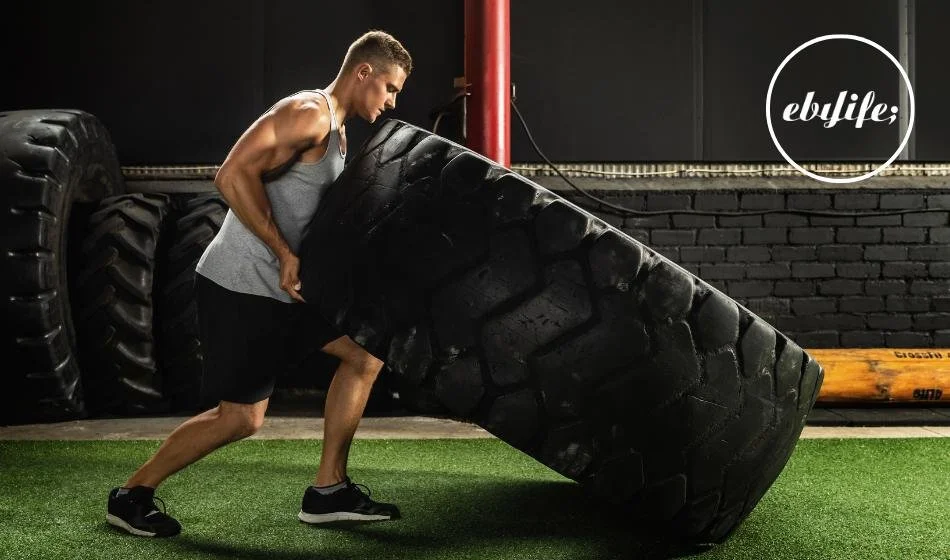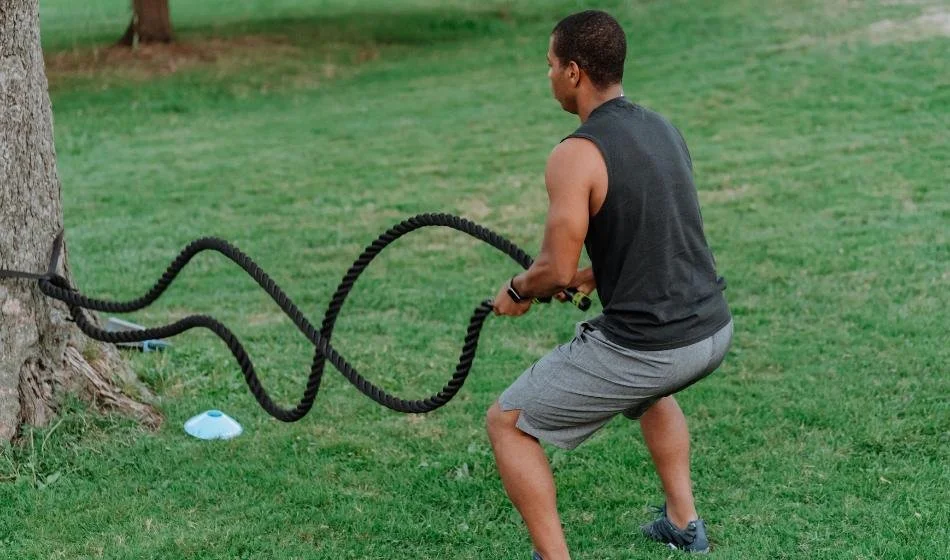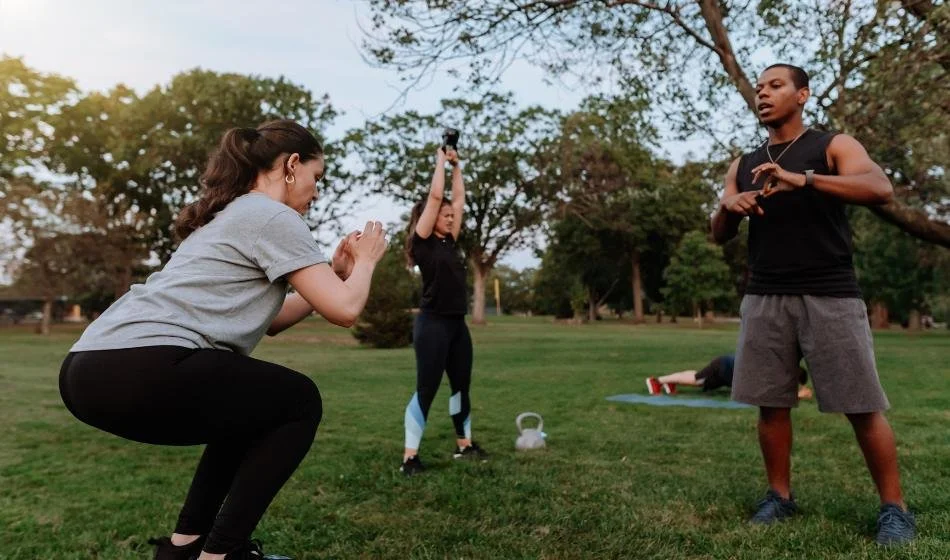What is Functional Strength Training?
Functional strength training primarily focuses on exercises that strengthen and prepare your body for the demands of real-life. Whether that’s pushing a lawnmower, carrying shopping bags upstairs or squatting down to pick something up from the floor. Unlike traditional strength training, which often focuses on aesthetic improvements and strength gain using basic and repetitive movement patterns and rep ranges to isolate specific muscles, functional strength training aims to engage multiple muscle groups simultaneously and with the full range of motion, enhancing your ability to perform everyday tasks with more ease and confidence.
What’s the Difference Between Functional Strength Training and Traditional Strength Training?
Functional strength training and traditional strength training both aim to increase muscle strength and improve overall fitness and well-being, but they do so in slightly different ways.
Functional Strength Training
Definition: Focuses on exercises that simulate everyday activities and movements. These exercises typically engage multiple muscle groups and movement patterns and aim to improve the overall range of motion, coordination and balance.
Exercises: Includes pistol and cyclist squats, Trx Bulgarian split squats, push-up variations, and single-leg deadlifts. These compound movements mimic real-life actions, making daily tasks easier.
Benefits: Enhances strength and functional fitness, making everyday activities easier by improving balance, coordination, flexibility, and reduces the risk of injury.
Traditional Strength Training
Definition: While there are different varieties and types of strength training, traditional strength training focuses more on building muscle mass and strength. It typically involves using a combination of compound and isolated exercises and pushing the muscles to exhaustion (repping out).
Exercises: Includes front and back squats, leg presses, Bulgarian split squats, bench presses and shoulder presses.
Benefits: Increases muscle mass and strength, which can enhance athletic performance and appearance. However, it may not always translate to improved functional fitness for everyday tasks.
Benefits of Functional Strength Training
Functional strength training offers a wide range of benefits that go beyond just building muscle. Here’s how it can enhance your overall health and fitness too:
Improved Daily Functionality
Enhanced Performance and real-life application: Functional exercises mimic everyday tasks, making it easier and safer to perform daily activities such as lifting, bending, and reaching.
Enhanced Coordination and Balance
Core Stability: Many functional strength exercises engage the core, improving posture and stability whilst reducing pain.
Better Balance: Exercises like step-back lunges and pistol squats enhance balance which can reduce the risk of falls and injuries. This becomes increasingly important as we age.
Increased Strength and Endurance
Building Muscle Strength: Functional exercises build strength that applies to daily life, helping you to lift and carry objects more easily.
Endurance Benefits: These exercises also improve muscular endurance, allowing you to perform activities for longer periods without fatigue.
Injury Prevention
Strengthening Muscles and Joints: Functional strength training strengthens the muscles and joints and increases the range of motion. By improving overall body mechanics, functional training helps prevent common injuries related to poor movement patterns.
Efficient Movement Patterns
Teaching Efficient Movements: Functional training teaches your body to move more efficiently, improving overall movement quality.
Importance of Proper Patterns: Proper movement patterns help to prevent overuse injuries and ensure that you can perform tasks with ease and confidence.
Strength training, including functional exercises, offers numerous benefits, especially for women. Discover more about why Women Should Lift Weights and how it can significantly improve your health and fitness.
How to Get Started with Functional Strength Training
Starting a new fitness routine can feel daunting but with the right approach and the following tips, you too can establish a long-term functional strength training routine. Here’s what to do:
Start with Basic Movements
Focus on the basic Exercises and Movement Patterns: Begin with the fundamental exercises like bodyweight squats, lunges, push-ups, and planks. These movements will help you form the foundation for functional strength training. Once you’ve mastered the basics of functional strength training, exploring 5 Training Methods to Take Your Fitness to the Next Level can help you continue to improve and reach new fitness heights.
Proper Form is Key: Prioritize learning each exercise with the correct form to prevent injuries and maximize the benefits. Consider starting with bodyweight exercises before progressing to heavier weights.
Examples of Basic Functional exercises
Squats: Mimic the motion of sitting down and standing up. This exercise targets the legs, glutes, and core. It’s progressive and there’s a variation to suit all fitness levels and abilities.
Lunges: Improve balance and coordination unilaterally while strengthening the legs and glutes. Much like squats, lunges are progressive and there’s a variation to suit all fitness levels and abilities.
Push-ups: The king of basic upper-body exercises. Push-ups are great for developing push strength in the shoulders, chest, and triceps whilst enhancing core stability.
Planks: This simple isometric exercise strengthens the core, shoulders and arms whilst improving overall stability and endurance.
Progress Your Workouts with Simple Equipment
Resistance Bands: Once you’ve mastered the bodyweight exercises, you can begin to increase the resistance and intensity with some simple equipment. Adding resistance bands to your routine will increase the intensity of your workouts and allow you to target different muscle groups.
Dumbbells and Kettlebells: Much like resistance bands, Incorporating free weights into your workouts will allow you to gradually increase resistance, add variety and challenge your muscles over time.
You can find effective tools that fit your budget, as outlined in our guide to The Best Home Exercise Equipment for $100 or Less.
Combining with Other Workouts
Integrating Functional Training: Combine functional strength training with other forms of exercise, such as cardio and flexibility training, for a more well-rounded fitness regimen and additional health benefits.
Variety is Key: Make sure to mix up your routine every 8-12 weeks. By doing so you’ll keep your body challenged which helps prevent stagnation and boredom.
Balancing Functional and Traditional Strength Training
Best of Both Worlds: Incorporate both functional and traditional strength training to achieve a well-balanced approach. This ensures you build overall strength, function and aesthetics.
Prevent Injury with Correct Form
Preventing Injuries: Prioritise correct form to avoid injuries and ensure that you’re targeting the right muscles. Proper technique will help you get the most out of each exercise.
Tips for Maintaining Correct Form
Start Slow: Begin with lighter weights or bodyweight exercises to allow you to focus on form.
Seek Guidance: Consider working with a personal trainer, even if just for a few sessions. A good trainer can not only help you master technique but can also give you guidance on progression. Learn more about the benefits of personalized training in our blog on The Power of Hiring a Personal Trainer.
Listen to Your Body: Pay attention to how your body feels during exercises and adjust as needed. Not every exercise is suitable for everyone.
Empathy for Beginners
Common Fears: It’s normal to feel intimidated by the gym or worried about starting a new routine. Remember, everyone starts somewhere and hopefully there’s a collective energy with your fellow gym-goers. If you aren’t comfortable going to the gym, start at home until you feel confident enough to train in front of others.
Overcoming Challenges: Focus on small, achievable goals and celebrate your progress, no matter how minor it may seem.
Encouragement and Tips
Stay Consistent: Consistency is key. Even if progress feels slow, sticking with your routine will yield big results over time. One workout per week for the next year is far more beneficial than 3 per week for 3 months and then nothing at all.
Find a Support System: Working out with a friend or joining a fitness community can provide motivation and accountability. If you aren’t sure where to start, consider working with a personal trainer to help you get started with your new fitness program.
Fun Fact
Did you know that with just 15 minutes of strength training, you can boost your metabolism, confidence and energy levels for the entire day? So, even on busy days, a quick workout can make a big difference. Sign Up Now!
Ebylife’s Unique Approach to Functional Strength Training
At Ebylife, we embrace a personalized and holistic approach to functional strength training, aiming to make fitness a rewarding and enjoyable part of your life.
Personalized Workout Plans
We create custom workout plans tailored to your unique needs, goals, and fitness level. Whether you’re a beginner or an experienced athlete, our plans are designed to challenge you and help you progress safely. Our programs cover a wide range of objectives, from enhancing daily functionality to preparing for specific sports or activities.
Expert Guidance
Our experienced trainers provide professional support, ensuring you perform exercises correctly and efficiently. They help boost your motivation and keep you accountable, acting as your biggest fan and support system.
Outdoor Functional Strength Training in Barcelona
Barcelona’s beautiful environment offers a unique backdrop for outdoor workouts. From the beaches to the parks, training in these scenic locations makes your workouts more enjoyable and refreshing. We often incorporate elements of the city’s landscape, like stair climbs at Montjuïc or resistance training on the beach, keeping workouts exciting and leveraging the natural benefits of outdoor exercise.
English-Speaking Personal Trainers in Barcelona
For expatriates and international clients, having an English-speaking trainer ensures clear communication and understanding, which is vital for effective instruction and building a comfortable trainer-client relationship. Our trainers are culturally sensitive and adaptable, making it easier for clients from different backgrounds to integrate into our training environment.
If you're unsure how to choose a trainer that fits your needs, check out our guide on How to Choose the Right Personal Trainer for You.
Client Testimonials
Jane, an expat from the UK, says, “Training with Ebylife has been an absolute game-changer for me. Their ability to communicate instructions and set a clear progressive training program made all the difference in my progress.”
John, an international student, adds, “I love how the workouts incorporate Barcelona’s beautiful outdoor spaces. It makes exercising feel like less of a chore and more of an adventure!”
Conclusion
In summary, functional strength training is a powerful and versatile approach to strength training that goes beyond traditional muscle-building exercises. By focusing on movements that mimic everyday activities, it enhances your ability to perform daily tasks with ease, improves overall strength and coordination, and reduces the risk of injury. Functional strength training is not just about building muscles; it's about building a better, more resilient body that can handle the demands of everyday life.
By integrating functional strength training into your routine, you can achieve a more balanced and effective workout that not only helps you look good but also feel good. From improving daily functionality and enhancing coordination to increasing strength and promoting longevity, the benefits of functional strength training are vast and impactful.
Are you ready to transform your fitness routine and experience the benefits of functional strength training in Barcelona? Contact Ebylife today to start your personalized training program.





